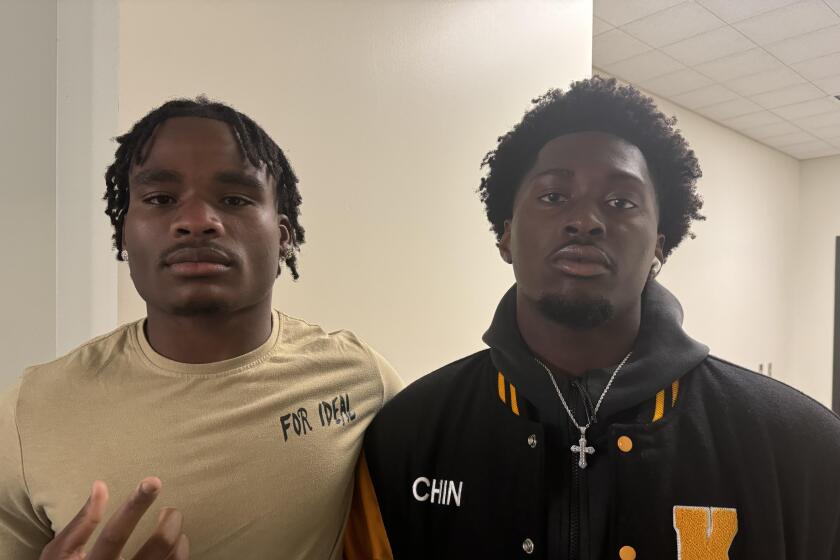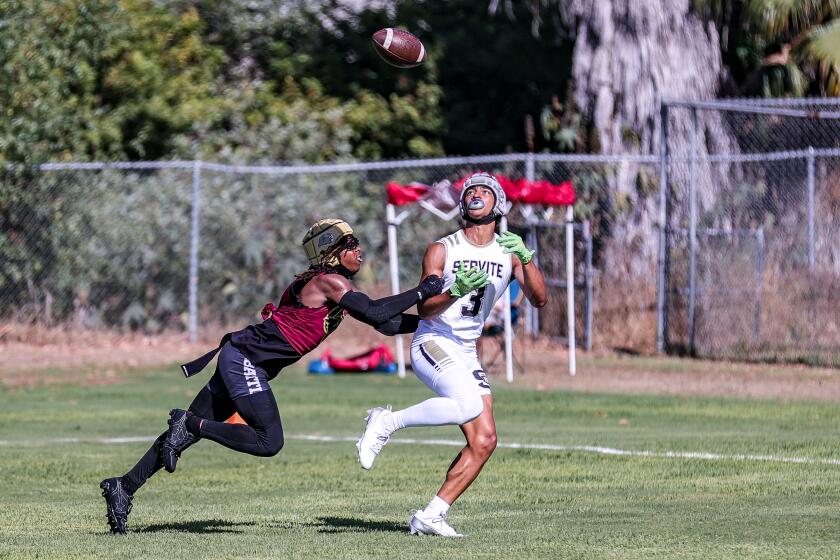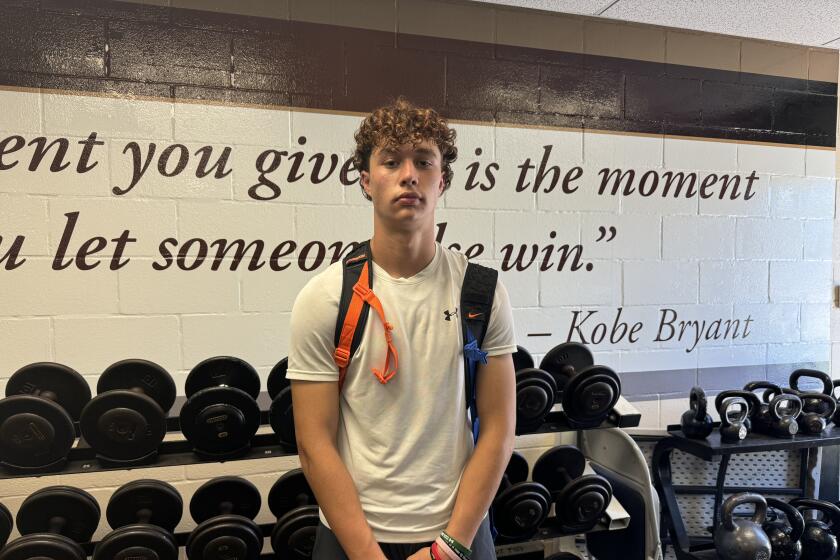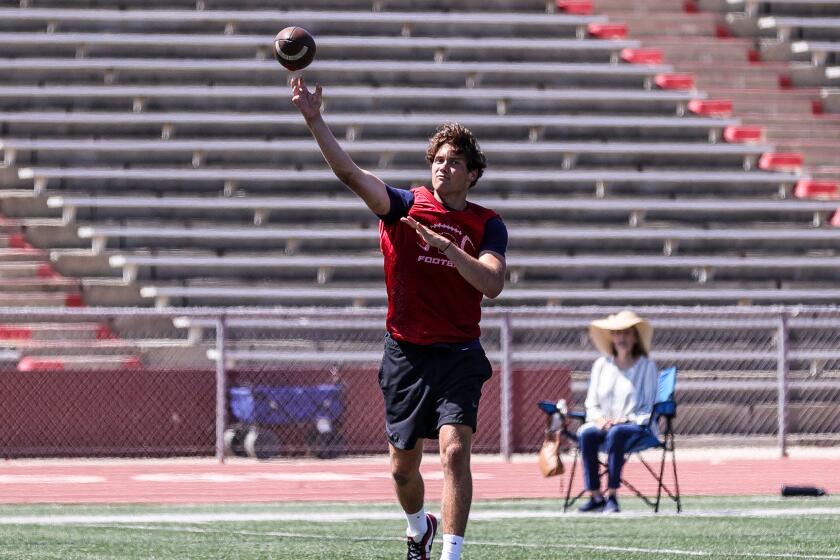Cal Lutheran and Northridge: the Old and the New : Shoup Thrives With Vintage Look at CLU
Bob Shoup has a wine collection he’s particularly proud of. He likes music, but not that be-boppin’ modern stuff--Georgie Boy or Boy Georgie, whatever his name is. He’d call Mike and the Mechanics to fix his car. But Mozart--now he knew what he was doing--and Beethoven could string a few notes together.
Speaking of the masters, Shoup enjoys the game of ancients. After 18 holes of divots and duck hooks, he eases back into his role as a Renaissance man. He sinks into a lounger and reads European history books, or tunes in to public television for ballet and opera. Anything that has weathered the test of time seems to endear itself to Shoup.
It comes as no surprise, then, that Shoup would etch himself into the modest history of Cal Lutheran--his employer for a quarter century--by outlasting everyone else there. The 54-year-old football coach opens his 25th season at the university today when the Kingsmen play host to San Francisco State at Mount Clef Stadium.
That Shoup has managed not only to keep his wits, but to flourish at the school is worth further examination. The day he showed up at the new college in 1962, there were no facilities for football. No showers. No locker room. No field. No money. And certainly no prestige. Still, he has compiled a 172-59-6 record, the second-best mark among active NCAA Division II coaches.
Shoup, who had coached for five years at North High in Torrance before 1962, actually took a pay cut to come to Lutheran. Obviously not an economics whiz, the coach said, “It just seemed like the right thing to do.” Buying the Brooklyn Bridge probably wasn’t out of the question, either.
His first concern after arriving at the new school was finding a place to practice. After initially settling for a lumpy orange grove, Shoup eventually carved out a field and shared it with the women’s field hockey team.
If that wasn’t embarrassing enough, rustling up a team bus was. Shoup borrowed an old beat-up bus from the Navy. And until the field was completed, Cal Lutheran played its home games at Camarillo and Moorpark high schools. Worst of all was his team’s play on the field. In their first game in ‘62, the Kingsmen lost to the Occidental freshman team, 8-0.
“It was terrible,” Shoup said. “It was a second-thought situation. When I saw the way we played, I thought we would lose every game.”
It is ironic that after the coach’s first game, he gave more thought to leaving than he has ever since.
The ’62 season had its moments. On a trip to play Claremont, the old Navy bus Shoup had borrowed broke down. Said Fred Kemp, who was later voted the team’s most valuable player: “We were stranded in a Spanish neighborhood. I went to look for a phone, but I didn’t speak Spanish. None of us did. When we finally found a phone, we called Claremont and their players had to come pick us up.”
The ’62 team finished with bruised egos and a 3-4 record that included a rousing 13-6 victory over Cal Tech. Overall, though, Shoup called the season, “Horrible.”
Kemp said some of the players on the team had never played football before. “We had some good football players,” he said, “but not very many. The only time I left the field was during kickoffs.”
The Kingsmen were 5-4 the following year. And it was during 1963 that Shoup helped bring the Dallas Cowboys to Cal Lutheran for their summer training camp. Cowboy President Tex Schramm liked the Thousand Oaks site because the weather was cooler than Dallas, it offered isolation, but was relatively close to a major airport.
The Cowboys have stayed on, bringing the school both money and exposure from the media. That helped Shoup in recruiting players to an otherwise obscure place.
The ’64 season played an important part in Cal Lutheran’s history, according to Shoup. After the team flew to Denver en route to play at Colorado College, the coach ran low on funds and didn’t know how the Kingsmen were going to make it from Denver to Colorado Springs. After scraping and begging, Shoup finagled the use of a municipal bus. Making matters worse, Cal Lutheran had only 26 players because of injuries.
“We should’ve lost that game by three or four touchdowns,” he said. “Instead, we won by three touchdowns.”
Even more significant, the Kingsmen found on that trip what has since become their lucky charm. A pair of ladies’ blue slippers.
“We found them in a motel in Colorado Springs,” Shoup said. “The manager threw them in the team bag. I guess he thought they belonged to one of the players. We started taking them wherever we went. We’ve won 90% of our games when we’ve had those slippers with us.”
If the slippers actually belonged to one of the players, none of them ever admitted it.
Don Garrison, a long-time Cal Lutheran assistant, said the slippers have remained through the years as a reminder of the school’s humble beginnings. “They symbolize Cal Lutheran football,” he said. “They’re an old pair of slippers that no one would give two cents for.”
Garrison, a tough defensive coach, acknowledged that he never got used to seeing football players rubbing and kissing slippers as part of their pregame ritual, but he looked the other way since it seemed to work.
In 1965, Shoup had his first great team. When the coach first came to Cal Lutheran from North High, he brought many of his former players with him. Those players were finally college seniors and the benefits of playing together for four years finally came to the forefront.
“Until that time,” Shoup said. “We were just a pseudo junior varsity team.” The Kingsmen finished 8-1 that season and from then until ‘72, Cal Lutheran won 56 games and lost only eight.
Lutheran had a banner recruiting year in 1968, when the school focused its recruiting on Orange County. According to Shoup, 13 Orange County high school all-stars came to the college that year. In addition, Shoup landed a player from Ventura County that he said had as much influence on the program as any player ever has--a linebacker named Sam Cvijanovich.
When Cvijanovich and the ’68 recruits were seniors in 1971, Cal Lutheran won the NAIA Division II championship. The Kingsmen beat Westminster of Pittsburgh in the championship game at Cal Lutheran.
Said Cvijanovich, a two-time All-American: “We had a wild bunch of guys. They called me ‘Wild Sam.’ But Shoup gave us free reign. He told me to be the team’s inspirational leader. And I was. We were really into it. We played good defense and the offense was strong, too.”
The championship came none too early for the football program and the school. The Lutheran Church, which owned and operated the college, planned to close the school in 1971 because it was losing money. The brethren were going to get out before they lost their clerical robes. But the national championship stirred up enough recognition that some church leaders changed their minds. “That was the turning point for the school,” Shoup said.
After winning the national title, Shoup considered moving on. He even interviewed for jobs at Montana, Idaho State, Cal State Fullerton and Pacific Lutheran in Tacoma, Wash. “That was as close as I ever came to leaving,” he said. “I was given legitimate offers, but as I looked around, I felt rooted to this place. The school offered to give me more support so I made a commitment to stay.”
With the exception of 1972 and ‘73, when the team was 11-9, Shoup’s teams in the ‘70s never lost more than two games in a single season. The ’75 team was ranked No. 1 in the NAIA poll for 10 weeks before falling to Texas Lutheran in the national championship game.
Four years ago, Cal Lutheran decided to join the Western Football Conference, an NCAA Division II league. The Kingsmen could either continue beating up teams like George Fox and Redlands or step up to the higher level of the WFC. Shoup said he wanted to move up.
But the move hasn’t been easy. Even though Cal Lutheran’s student body has grown to 3,000, still it offers fewer scholarships--50 partial scholarships--than any other school in the conference. The Kingsmen were 4-6 in ‘83, 5-4-1 in ’84 and 6-5 last year.
“We’re back to where we were in the early ‘60s,” Shoup said. “It’s been a struggle.”
Shoup, though, knew as well as anyone that history often repeats itself.
Garrison said the coach found ways to hurdle obstacles. “Bob has used the church as a recruiting tool,” he said. “He had a lot of associates--a lot of them were ministers--who helped him. Plus, the church offered other scholarships, spiritual and academic, for some students who just happened to be good football players.”
Certainly, the good Lord has nothing against a 6-4, 235-pound tight end who lives proper and catches touchdown passes.
While the majority of Cal Lutheran’s players have had marginal talent, some have gone on to careers in professional football. The ’71 team alone had a number of players who later played pro football. Cvijanovich was the Canadian Football League’s rookie of the year. Ralph Miller played for the Houston Oilers, Brian Kelley was a linebacker with the New York Giants for 12 years. Hank Bauer, who graduated in ‘75, played with the San Diego Chargers and Charlie McShane played with the Seattle Seahawks.
But most of the former players are now accountants, lawyers, salesmen and businessmen. The question remains how Shoup has been able to maintain such a consistently strong program over the years.
No one seems to know. Even those who have worked closely with him give different--even contradictory--explanations.
“He knows the game,” Garrison said. “He knows what he wants to do on offense and he does it. He has an imaginative mind. He’s very unpredictable on offense. You’re not sure what he’s going to do next. I wasn’t even sure what he was doing.”
Said Cvijanovich: “He was more creative with his defense than his offense.”
“He knows people,” said Ernie Sandlin, defensive line coach. “He knows what they are capable of doing. And he’s definitely a good motivator.”
Said Tom Bonds, this year’s starting quarterback: “At times, it would be nice to have a more motivational coach. But he creates a good laidback atmoshere. His offense is pretty simple.”
Said Pete Alamar, who played under Shoup and now is an assistant coach: “When you play for him, you sort of wonder what it is about him that makes him so good. Nothing really ever stood out.”
Nothing, of course, except the record.
Shoup hasn’t changed much through the years. He has remained a quiet coach. He rarely screams at players and he delegates authority to his assistants. He has the demeanor of a minister. Just looking at him, you’d just as soon expect to hear him say “Let us pray,” as anything else. He is, in fact, a religious person and many believe that is why he has not left Cal Lutheran.
And after 24 years, he said he won’t leave now. “My energy level isn’t what it used to be. I have a back problem and a neck problem. But as long as I can stay up with the youngsters, as long as I can be effective, I’ll stay around.”
Get our high school sports newsletter
Prep Rally is devoted to the SoCal high school sports experience, bringing you scores, stories and a behind-the-scenes look at what makes prep sports so popular.
You may occasionally receive promotional content from the Los Angeles Times.



